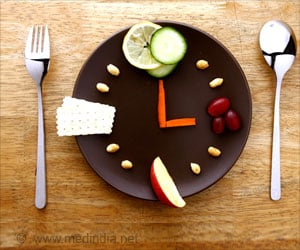Time-restricted eating has many health benefits. Daily timing of food intake can play a major role in reducing diabetes-related nocturnal hypertension.

‘Daily timing of food intake can play a major role in reducing diabetes-related nocturnal hypertension.’





Study authors Ming Gong, Ph.D., M.D., professor in the Department of Physiology, and Zhenheng Guo, Ph.D., professor in the Department of Pharmacology and Nutritional Sciences, are hopeful their findings will mean time-restricted eating could offer similar benefits for people.“We are excited about these findings and the implications they could have in future clinical studies," said Guo. “In addition to lifestyle changes like diet and exercise, time-restricted eating could have a healthy impact on people with Type 2 diabetes.”
Normally, blood pressure falls at night and increases upon awakening, in line with the body’s circadian rhythm. In some hypertensive patients, the typical nighttime decrease does not occur. This “nondipping” blood pressure is prevalent in patients with Type 2 diabetes and is associated with increased events of cardiovascular disease.
The study found that imposing time-restricted feeding prevented diabetic mice from developing non-dipping blood pressure. The practice also effectively restored the disrupted blood pressure circadian rhythm in mice that already had nondipping blood pressure.
Researchers restricted the mice's access to food to eight hours during their typical active awake times every day. When food availability was increased to 12 hours, the practice was still effective in preventing and treating nondipping blood pressure.
Advertisement
In addition to the study’s significance for future clinical research in people, Gong says it’s adding to scientists’ understanding of the causes and mechanisms of nondipping blood pressure in diabetes, which is currently not fully understood.
Advertisement
“This is the first basic science research focused on how it impacts nondipping blood pressure related to diabetes and it reveals that the daily timing of food intake could play a critical role.”
Source-Newswise















